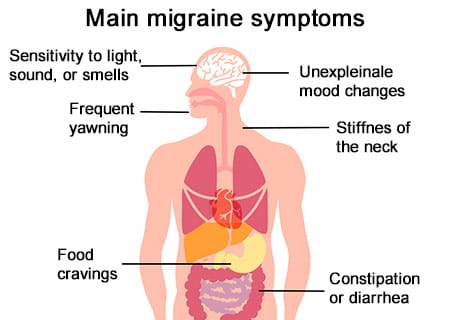The information provided on this website is intended for general informational purposes only. It does not constitute definitive treatment advice. For any questions or issues related to pain management, it is crucial to consult a medical professional. A thorough evaluation is essential for an accurate diagnosis and treatment plan.
×On This Page
Migraine is one of the most common forms of headache and can severely affect life. Nevertheless, the possibilities for prevention remain largely unused.
Not even half of the people who go to the family doctor or physician for migraines get information about preventive measures there. Migraine prophylaxis can often significantly improve the quality of life.
 Migraine prophylaxis aims to:
Migraine prophylaxis aims to:
A migraine attack can have various triggers – such as foods like cheese, chocolate, red wine, or an irregular sleep-wake cycle. As a preventive measure, one should avoid such trigger factors as much as possible.
In addition to this change in behavior, various medications and non-medicinal methods are proven to be suitable for doing something to prevent migraine attacks.
Medications are particularly suitable for people who have frequent migraines or who experience particularly severe symptoms or a persistent aura in the event of a migraine attack. Because of the suffering, the restriction of the quality of life and the risk of medication overuse are particularly high.
In addition, drug migraine prophylaxis can be useful if:
 There are many different medications for migraines. The best proof is the preventive effect of the following active ingredients:
There are many different medications for migraines. The best proof is the preventive effect of the following active ingredients:
The following remedies also help prevent migraines, but are less well studied:
Which medicine the doctor ultimately prescribes depends on the frequency of the migraine attacks and any additional illnesses.
There are various non-drug treatments that can effectively prevent migraine attacks. What has been proven to help is acupuncture according to the principles of Traditional Chinese Medicine.
Behavioral therapy can also supplement medicinal migraine prophylaxis. A balanced lifestyle, on the other hand, can increase the intervals between migraine attacks. Relaxation procedures, cognitive behavioral therapy, or biofeedback are ideal options.
If you have migraine attacks particularly often and your quality of life is severely limited, psychological pain therapy can also help. These include, for example, procedures for coping with pain and stress management, as well as relaxation procedures, like progressive muscle relaxation.
Furthermore, regular endurance training – such as jogging, swimming or cycling – is recommended for migraine prophylaxis, because the training also seems to reduce the frequency of attacks.
If you prefer not to take tablets for migraine prophylaxis, you can opt for non-drug treatments instead. In certain circumstances, this is even advisable – for example:
Under certain circumstances, a local anesthetic or a corticosteroid can be injected into the vicinity of the large occipital nerve, this so-called occipital nerve block interrupts the conduction of excitation in the occipital nerve.
In addition to the well-studied medication and non-medicinal methods for prophylaxis, there are also numerous migraine treatment methods whose effectiveness has not been proven or which, according to the current data, are ineffective.
Other procedures whose benefits in migraine prophylaxis have not yet been proven are:
In conclusion, if you are suffering from migraine headaches and they seem to play a significant role on your quality of life, perhaps it’s time to think about migraine prophylaxis. Talk to one of our migraine specialists at Pain Physician and find out which prophylaxis method is most suitable for you.
Pain Management Brooklyn
2279 Coney Island Ave, Brooklyn, NY 11223
(718) 998 – 9890